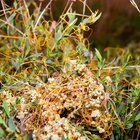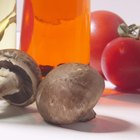
Jupiterimages/Photos.com/Getty Images
Nutgrass is a perennial herb that is considered to be a noxious weed in many areas. However, Ayurvedic practitioners have valued the root of the nutgrass plant for its medicinal qualities for many years. The nutgrass plant, or cyperus rotundus, has been touted as an aid for lightening the skin, reducing the effects of aging and controlling weight, although the research is limited. Extrapone is a specific formulation of nutgrass that is used to treat skin conditions.
Identification
Symrise, a German-based company, developed extrapone nutgrass from the cyperus rotundus plant that is native to India. Nutgrass contains a volatile oil with b-pinene, cyperene, a-cyperone b-cyperone and a-cyperol. It also has alkaloids, flavonoids and triterpenes, according to one manufacturer of the product. Various skin creams contain extrapone nutgrass as an alternative to hydroquinone, a common skin lightener in many commercial products. Extrapone nutgrass is not toxic or carcinogenic and has no reported side effects, according to the website, WLTips Skincare.
Skin Care
Extrapone nutgrass is advertised as a natural skin lightener. Manufacturers state that clinical trials have shown it inhibits melanin by more than 41 percent. However, no other information regarding clinical trials is available. Ayurvedic practitioners also use regular preparations of nutgrass to treat other skin conditions, including fungus infestation, itching, rashes and herpes. However, no valid scientific research suggests that any form of nutgrass successfully treats skin problems.
Antidiarrheal Properties
Nutgrass could help to inhibit diarrhea in some people, according to a review published in 2010 in “Journal of Ayurveda and Integrative Medicine.” Researchers gave mice castor oil to induce diarrhea. The mice were then treated with nutgrass, aconitum heterophyllum or an antidiarrhea medication. Researchers found that the mice treated with nutgrass had a 46 percent inhibition of diarrhea. Traditional medication, however, caused a 65 percent reduction. Note that this research tested nutgrass; extrapone nutgrass was not used in the study.
Weight Loss
Nutgrass may also inhibit weight gain. However, research has not investigated the extrapone preparation. A 2007 study published in “Phytotherapy Research” examined the effect of cyperus rotundus, or nutgrass, on obese rats. Researchers gave some rats daily doses of nutgrass extract for 60 days. This group of rats displayed a significant reduction in weight without affecting food portions or causing toxicity. However, animal research does not mean that the same results would be replicated in humans.
Related Articles

Magna Rx Side Effects

Health Benefits of Raw Peanuts

Recommended Daily Dosage of Saw ...

Side Effects of Monosodium Glutamate

Chamomile & Aloe Skin Care

Traditional Uses of Cuscuta

Skin Benefits of Eating Coconut Oil

The Use of Neem Juice in Skin Care as ...

Chasteberry for Acne

Rosebud Salve for Acne?

Arginine for Hair Growth

Natural Ways to Get Rid of Scabies

Jojoba Oil Benefits

Fraxel Laser Treatment Dangers

Burdock Root for Acne

Dimethicone Hazards

Herbs For Melasma

Snail Cream Benefits

Mineral Oil Vs. Olive Oil

Can Borage Oil Help Acne?
References
- Calflora: Cyperus Rotundus
- XtendLife: Extrapone Nutgrass Root
- Journal of Ayurveda and Integrative Medicine: Cyperus Rotundus, a Substitute for Aconitum Heterophyllum: Studies on the Ayurvedic Concept of Abhava Pratinidhi Dravya (drug substitution)
- Phytotherapy Research: Administration of Cyperus Rotundus Tubers Extract Prevents Weight Gain in Obese Zucker Rats
Writer Bio
Ireland Wolfe has been writing professionally since 2009, contributing to Toonari Post, Africana Online and Winzer Insurance. She obtained her Bachelor of Arts in psychology and Master of Arts in mental health counseling. She is also a licensed mental health counselor, registered nutritionist and yoga teacher.
Photo Credits
Jupiterimages/Photos.com/Getty Images